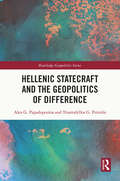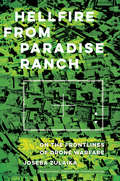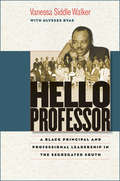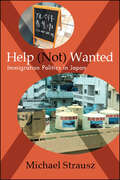- Table View
- List View
Hell's Angels: A Strange and Terrible Saga (Popular Penguins Series)
by Hunter S. ThompsonGonzo journalist and literary roustabout Hunter S. Thompson flies with the angels--Hell's Angels, that is. He's lived with them, he knows them and their machines, he speaks their langauge,and he reports it back to the world with all the fearsome force of a souped-up cyclone burning rubber.
Hell's Princess: The Mystery of Belle Gunness, Butcher of Men
by Harold SchechterHell’s Princess is a riveting account of one of the most sensational killing sprees in the annals of American crime: the shocking series of murders committed by the woman who came to be known as Lady Bluebeard. The only definitive book on this notorious case and the first to reveal previously unknown information about its subject, Harold Schechter's gripping, suspenseful narrative has all the elements of a classic mystery.
Hella Nation
by Evan WrightRead Evan Wright's posts on the Penguin Blog. The New York Times bestselling author of Generation Kill immerses himself in even more cultures on the edge. Evan Wright's affinity for outsiders has inspired this deeply personal journey through what he calls "the lost tribes of America." A collection of previously published pieces, Hella Nation delivers provocative accounts of sex workers in Porn Valley, a Hollywood über-agent-turned-war documentarian and hero of America's far right, runaway teens earning corporate dollars as skateboard pitchmen, radical anarchists plotting the overthrow of corporate America, and young American troops on the hunt for terrorists in the combat zones of the Middle East
Hella Nation
by Evan WrightRead Evan Wright's posts on the Penguin Blog. The New York Times bestselling author of Generation Kill immerses himself in even more cultures on the edge. Evan Wright's affinity for outsiders has inspired this deeply personal journey through what he calls "the lost tribes of America." A collection of previously published pieces, Hella Nation delivers provocative accounts of sex workers in Porn Valley, a Hollywood über-agent-turned-war documentarian and hero of America's far right, runaway teens earning corporate dollars as skateboard pitchmen, radical anarchists plotting the overthrow of corporate America, and young American troops on the hunt for terrorists in the combat zones of the Middle East
Hellacious California!: Tales of Rascality, Revelry, Dissipation, and Depravity, and the Birth of the Golden State
by Gary Noy“Teems with bittersweet compounds of 19th-century nefariousness, including . . . gambling, knife fights, the demon drink, con artistry, and prostitution.” —Los Angeles Review of BooksIn 1855 an ex-miner lamented that nineteenth-century California “can and does furnish the best bad things,” including “purer liquors . . . finer tobacco, truer guns and pistols, larger dirks and bowie knives, and prettier courtezans [sic]” than anywhere else in America. Lured by boons of gold and other exploitable resources, California’s settler population mushroomed under Mexican and early American control, and this period of rapid transformation gave rise to a freewheeling culture best epitomized by its entertainments. Hellacious California tours the rambunctious and occasionally appalling amusements of the Golden State: gambling, gun duels, knife fights, gracious dining and gluttony, prostitution, fandangos, cigars, con artistry, and the demon drink. Historian Gary Noy unearths myriad primary sources, many of which have never before been published, to spin his true tall tales that are by turns humorous and horrifying. Whether detailing the exploits of an inebriated stallion, gambling parlors as a reinforcement and subversion of racial norms, armed skirmishes over eggs, or the ins and outs of the “Spirit Lover” scam, Noy expertly situates these stories in the context of a live-for-the-moment society characterized by audacity, bigotry, and risk.“Confidently carries the reader into the everyday lives of early Californians. The focus on Californians’ popular pastimes . . . with an eye on vice, decadence, and scandal, makes this book a rowdy tour.” —Dr. Patrick Ettinger, Professor of History, California State University, Sacramento; Former Director of CSUS Public History Program and the Capital Campus Oral History Program
Hellenic Statecraft and the Geopolitics of Difference (Routledge Geopolitics Series)
by Alex G. Papadopoulos Triantafyllos G. PetridisThis book explores competing definitions of Hellenism in the making of the Greek state by drawing on critical historical and geopolitical perspectives and their intersection with difference and exclusion. It examines Greece’s central role in shaping the state system, regional security, and nationalisms of the Balkans, the Black Sea, and the Eastern Mediterranean regions. Understanding the Greek State's social constitution helps learn about the past and present intentions and strategies as well as local, national, and European notions of security and identity. The book looks at the relation of subaltern communities to state power and the state’s ability and willingness to negotiate difference. It also explores how the State’s identity politics shaped regional geopolitics in the past two centuries. Chapters present case studies that shed light on the Hellenization of Jewish Thessaloniki, the Treaty of Lausanne’s making of Western Thrace’s Muslim minority, the role and modes of settlement, urbanization, and ‘bordering-as-statecraft’ in Eastern Macedonia and Western Thrace, and the politics of erecting the Athens Mosque, the first officially-licensed mosque outside Western Thrace since Greek Independence. With examples from fieldwork in Greek cities and borderlands, this book offers a wealth of primary research from geographers and historians on the modern history of Greek statehood. It will be of key interest to scholars of political geography, international relations, and European history.
Hellenism and Homosexuality in Victorian Oxford
by Linda DowlingIn April 1895, Oscar Wilde stood in the prisoner's dock of the Old Bailey, charged with "acts of gross indecency with another male person. These filthy practices, the prosecutor declared, posed a deadly threat to English society, "a sore which cannot fail in time to corrupt and taint it all." Wilde responded with a speech of legendary eloquence, defending love between men as a love "such as Plato made the very basis of his philosophy, and such as you find in the sonnets of Michelangelo and Shakespeare." Electrified, the spectators in the courtroom burst into applause.Although Wilde was ultimately imprisoned, the courtroom response to his speech signaled a revolutionary moment-the emergence into the public sphere of a kind of love that had always been proscribed in English culture. In this luminous work of intellectual history, Linda Dowling offers the first detailed account of Oxford Hellenism, the Victorian philosophical and literary movement that made possible Wilde's brief triumph and anticipated the modern possibility of homosexuality as a positive social identity.A homosocial culture and a language of moral legitimacy for homosexuality emerged, Dowling argues, as unforeseen consequences of Oxford University reform. Through their search in Plato and Greek literature for a transcendental value that might substitute for a lost Christian theology, such liberal reformers as Benjamin Jowett unintentionally created a cultural context in which male love-the "spiritual procreancy" celebrated in Plato's Symposium-might be both experienced and justified in ideal terms. Dowling traces the institutional career of Hellenism from its roots in Oxford reform through its blossoming in an approach to Greek studies that came to operate as a code for homosexuality. Recreating the incidents, controversies, and scandals that heralded the growth of Hellenism, Dowling provides a new cultural and theoretical context within which to read writers as diverse as Wilde, Jowett, John Addington Symonds, Walter Pater, Lord Alfred Douglas, Robert Buchanan, and W. H. Mallock.
Hellfire from Paradise Ranch: On the Front Lines of Drone Warfare
by Joseba ZulaikaIn this intimate and innovative work, terror expert Joseba Zulaika examines drone warfare as manhunting carried out via satellite. Using Creech Air Force Base near Las Vegas as his center of study, he interviews drone operators as well as resisters to the war economy of the region to expose the layers of fantasy on which counterterrorism and its self-sustaining logic are grounded. Hellfire from Paradise Ranch exposes the terror and warfare of drone killings that dominate our modern military. It unveils the trauma drone operators experience, in part due to their visual intimacy with their victims, and explores the resistance to drone killings in the same apocalyptic Nevada desert where nuclear testing, pacifist militancy, and Shoshone tradition overlap. Stunning and absorbing, Zulaika offers a richly detailed account of how we continue to manufacture, deconstruct, and perpetuate terror.
Hellhound On His Trail: The Electrifying Account of the Largest Manhunt In American History
by Hampton SidesNATIONAL BESTSELLER • On April 4, 1968, James Earl Ray shot Martin Luther King Jr. at the Lorraine Motel. The nation was shocked, enraged, and saddened. As chaos erupted across the country and mourners gathered at King's funeral, investigators launched a sixty-five day search for King&’s assassin that would lead them across two continents—from the author of Blood and Thunder and Ghost Soldiers.With a blistering, cross-cutting narrative that draws on a wealth of dramatic unpublished documents, Hampton Sides, bestselling author of Ghost Soldiers, delivers a non-fiction thriller in the tradition of William Manchester's The Death of a President and Truman Capote's In Cold Blood. With Hellhound On His Trail, Sides shines a light on the largest manhunt in American history and brings it to life for all to see.With a New Afterword
Hellions: Pop Culture's Rebel Women
by Maria RahaWho is the iconic rebel? Is it a character from the legacy of James Dean or Clint Eastwood, or maybe a Beat Generation writer? Is it a woman?Modern pop culture and the media have distorted the notion of rebellion. Classic male rebels appear sexy, nomadic-naturally rebellious-while unorthodox women are reprimanded, made to fit unrealistic roles and body images, or mocked for their decadence and self-indulgence. In order to appreciate our legacy of female rebels-and create space for future cultural icons-the notion rebellion needs to be revaluated.From Madonna and Marilyn Monroe to the reality TV stars and hotel chain heiresses of the twenty-first century, Hellions analyzes the celebration of pop culture icons and its impact on notions of gender. Looking at these past examples, Hellions expands upon the definition of rebellion and offers a new understanding of what would be considered rebellious in the celebrity-obsessed media culture of the twenty-first century.
Hello Again: The most dangerous killer is the one you already know. (Evelyn Talbot series, Book 2) (Evelyn Talbot)
by Brenda NovakThis is SILENCE OF THE LAMBS meets Karen Rose...New York Times bestseller Brenda Novak's second novel in the Evelyn Talbot series, Hello Again, sees the return of psychiatrist Dr Evelyn Talbot in her purpose-built facility housing America's most terrifying psychopaths. Dr Evelyn Talbot has spent her life looking over her shoulder after her teenage boyfriend Jasper Moore kidnapped, tortured and left her for dead. She only just escaped with her life, he disappeared without a trace, and twenty-two years later Evelyn can still feel him lurking in the shadows. Studying the psychopathic minds at Hanover House - Alaska's first mental health facility for psychopaths - is how she will track him down.Lyman Bishop could be the perfect subject. Evelyn discovers he is just as intelligent and trustworthy as Jasper appeared, and he hardly seems like the man who has been convicted of kidnapping and murdering several women.But if Evelyn has learnt anything at all from her terrifying experience, it's that the most unassuming can be the most dangerous of all.Look for the other gripping novels in the Evelyn Talbot series - Her Darkest Nightmare, Face Off and the prequel novella, Hanover House, available now.
Hello Cleveland: Things You Should Know About the Most Unique City in the World
by Nick PerryHello Cleveland unlocks the hidden, larger-than life history and culture of Cleveland, Ohio, possibly the country's most misunderstood city. Locals, visitors, transplants, and people—who moved away as soon as they could—will gain a well-rounded picture of the city's passionate pursuits, dark corners, dubious claims to fame, and disarmingly friendly culture. Nick Perry, who grew up in Cleveland and then moved back as an adult, invites you to join him in taking a loving, brutally honest look under the hood. Develop an appreciation for local celebrities like Devo, Bone Thugs & Harmony, Lil' John and Big Chuck, and Dick Goddard the weather guy. Marvel at landmarks like the Great Lakes, the Metroparks, and the world's largest outdoor chandelier. There are plenty of downsides and none are sugarcoated. You'll discover why Cleveland is the reason for the creation of the Environmental Protection Act and how it's largely to blame for the widespread adoption of suburban city planning. But you can still find a heartwarming pride in rooting for sports teams that seem cursed to lose every championship. As the city's unofficial slogan says, "You've got to be tough," but there's a lot to love—especially when the world-famous Cleveland Orchestra wanders into the dive bar you're sitting in and starts to play an impromptu concert.
Hello Cruel World: 101 Alternatives to Suicide for Teens, Freaks, and Other Outlaws
by Kate Bornstein Sara QuinCelebrated transsexual trailblazer Kate Bornstein has, with more humor and spunk than any other, ushered us into a world of limitless possibility through a daring re-envisionment of the gender system as we know it.Here, Bornstein bravely and wittily shares personal and unorthodox methods of survival in an often cruel world. A one-of-a-kind guide to staying alive outside the box, Hello, Cruel World is a much-needed unconventional approach to life for those who want to stay on the edge, but alive.Hello, Cruel World features a catalog of 101 alternatives to suicide that range from the playful (moisturize!), to the irreverent (shatter some family values), to the highly controversial. Designed to encourage readers to give themselves permission to unleash their hearts' harmless desires, the book has only one directive: "Don't be mean." It is this guiding principle that brings its reader on a self-validating journey, which forges wholly new paths toward a resounding decision to choose life.Tenderly intimate and unapologetically edgy, Kate Bornstein is the radical role model, the affectionate best friend, and the guiding mentor all in one.
Hello Fossils and Shells (Little Guides to Nature #4)
by Nina ChakrabartiGet outside and explore a world of fascinating fossils and shells with this beautifully illustrated pocket guide for children.Why do some shells have shimmery rainbow linings? And can you tell a trilobite from an ammonite? Beautiful gallery-style pages showcase creatures fossilised in amber, spiny fossils and an amazing array of colourful seashells. Fun off-the-page activity spreads include tips on fossil hunting and how to make fossil imprints using shells.With colourful illustrations and amazing facts, outdoor activities to try and features on shell patterns, great fossil finds and living fossils, this little book will provide hours of pleasure, both indoors and out.Be inspired to go outdoors and get up close with nature with this brand-new series from internationally bestselling illustrator Nina Chakrabarti. Also in this series: Hello Trees, Hello Fungi and Hello Bugs.
Hello Fungi: A Little Guide To Nature (Little Guides to Nature #2)
by Nina ChakrabartiGet outside and explore the fascinating world of fungi with this beautifully illustrated pocket guide.Did you know that fungi are not quite plant, not quite animal and not quite bacteria, but a unique organism in a kingdom all of their own? Beautiful gallery-style pages showcase a fascinating world of fungi, including glow-in-dark fungi, the funky fungi that give off the strongest smell and the most colourful fungi. Creative off-the-page activity spreads include how to make a spore print and a recipe for delicious store-bought mushrooms on toast.With tips on mushroom identification (including the ones to avoid!), fungi-based activities to enjoy, and a guide to the most colourful and unusual mushrooms, this little book will provide hours of pleasure, both indoors and out.Be inspired to go outdoors and get up close with nature with this brand-new series from internationally bestselling illustrator Nina Chakrabarti. Also in this series: Hello Trees, Hello Bugs and Hello Fossils and Shells.
Hello Professor: A Black Principal and Professional Leadership in the Segregated South
by Vanessa Siddle Walker Ulysses ByasLike many black school principals, Ulysses Byas, who served the Gainesville, Georgia, school system in the 1950s and 1960s, was reverently addressed by community members as "Professor." He kept copious notes and records throughout his career, documenting efforts to improve the education of blacks. Through conversations with Byas and access to his extensive archives on his principalship, Vanessa Siddle Walker finds that black principals were well positioned in the community to serve as conduits of ideas, knowledge, and tools to support black resistance to officially sanctioned regressive educational systems in the Jim Crow South. Walker explains that principals participated in local, regional, and national associations, comprising a black educational network through which power structures were formed and ideas were spread to schools across the South. The professor enabled local school empowerment and applied the collective wisdom of the network to pursue common school projects such as pressuring school superintendents for funding, structuring professional development for teachers, and generating local action that was informed by research in academic practice. The professor was uniquely positioned to learn about and deploy resources made available through these networks. Walker's record of the transfer of ideology from black organizations into a local setting illuminates the remembered activities of black schools throughout the South and recalls for a new generation the role of the professor in uplifting black communities.
Hello Stranger: Musings on Modern Intimacies
by Manuel BetancourtWitty and winkingly playful, Manuel Betancourt&’s Hello Stranger explores modern queer romance and the expansive possibilities of ephemeral intimacies&“Hello stranger.&” As an opening line, you really can&’t ask for better.Hello Stranger is a book about chance encounters—at a bar, through social media, in a bathhouse—and what a stranger can reveal about who we are and who we could still yet be. A stranger, after all, is a site of endless possibilities.As Manuel Betancourt looks back on his past relationships, he turns to characters and narratives that helped him question notions of what monogamy and coupledom (and relationships and marriage) can and should look like. From films like Before Sunrise and Cruising to the poetry of Frank O'Hara and the musicals of Stephen Sondheim, Betancourt uses pop culture to make sense of the alluring prospect of forging intimacies with strangers—even, or especially, the strangers within ourselves.At once a personal excavation and a broad cultural critique, Betancourt grapples with everything from online sexting and real-life cruising to divorces and throuples. Hello Stranger examines the intimacies we crave, value, and oftentimes destroy with rote familiarity.
Hello Trees (Little Guides to Nature #1)
by Nina ChakrabartiGet outside and explore the magnificent world of trees with this beautifully illustrated pocket guide.Witness a tree's growth from seed to sapling and discover how trees come together to support each other in forests in this beautiful pocket guide to nature. Illustrated gallery-style pages show children how to identify a tree from its seeds, take a closer look leaf function and shape and highlights some of the oldest and the tallest trees from around the world.A book to inspire budding naturalists aged 6 and up, Hello Trees also includes creative off-the-page activities for children to try, including growing a tree from an avocado seed and creating amazing art by painting leaves and bark rubbing.Be inspired to go outdoors and get up close with nature with this brand-new series from internationally bestselling illustrator Nina Chakrabarti. Also in this series: Hello Fungi, Hello Bugs and Hello Fossils and Shells.
Hello, Cutie!
by Pamela KlaffkeA doe-eyed doll, a smiley-faced cupcake, a sweet plush kitten: they're cute?and cute is at the heart of a growing legion of adult collectors and enthusiasts who live and breathe all things cuddly and adorable.Journalist and writer Pamela Klaffke, author of Spree: A Cultural History of Shopping and herself an avid collector of cute since she was a child, takes readers on a rainbow-and-unicorn-filled journey through cute culture, from its origins in Japan where teenaged girls help drive the "cute" economy, to its modern-day manifestations in the bubblegum-colored careers of performers like Katy Perry. The book also delves into the fanatical world of cute creators and collectors, the psychology of nostalgia, and the phenomenon known as creepy/cute. There's also cute food, anthropomorphized animals, and cute superstars such as Blythe, My Little Pony, and Hello Kitty herself. Full-color throughout, the book also includes many photographs of cute objects from the author's extensive personal collection.As charming and captivating as its subject matter, Hello, Cutie! invites readers to indulge their cuddliest guilty pleasures. It's as cute as can be!Pamela Klaffke is the author of Spree: A Cultural History of Shopping.
Hello, Everybody!: The Dawn of American Radio
by Anthony Rudel&“A lively overview&” of this pre-internet mass-communication tool and &“the entrepreneurs and evangelists, hucksters and opportunists&” who flocked to it (Publishers Weekly). Long before the Internet, another young technology was transforming the way we connect with the world. At the dawn of the twentieth century, radio grew from an obscure hobby into a mass medium with the power to reach millions of people. When amateur enthusiasts began sending fuzzy signals from their garages and rooftops, radio broadcasting was born. Sensing the medium&’s potential, snake-oil salesmen and preachers took to the air, innovating styles of mass communication and entertainment while making bedlam of the airwaves. Into this wild new frontier stepped a young secretary of commerce, Herbert Hoover, whose passion for organization transformed radio into an even more powerful political, cultural and economic force. When a charismatic bandleader named Rudy Vallée created the first on-air variety show and America elected Franklin Delano Roosevelt, who communicated with the public through his famous fireside chats, radio had arrived. With extensive knowledge, humor, and an eye for outsized characters forgotten by history, Anthony Rudel tells the story of the boisterous years when radio took its place in the nation&’s living room. &“Entertaining and informative.&” —The Denver Post &“Rudel, with extensive professional radio experience, revels in the enterprising personalities who set up shop on this technological frontier. . . .[And] vividly re-creates the anything-goes atmosphere of the ether&’s early days.&” —Booklist
Hello, World! Dinosaurs (Hello, World!)
by Jill McDonaldLearn from home and explore the world with these fun and easy board books!All young children love dinosaurs. Here&’s a Hello, World! board book that teaches toddlers all about Triceratops, Stegosaurus, T-rex, and many more—with colors, shapes, sizes, and super-simple facts. Hello, World! is a series designed to introduce first nonfiction concepts to babies and toddlers. Told in clear and easy terms (&“T. rex&’s arms were very small, even though its body was large&”) and featuring bright, cheerful illustrations, Hello, World! makes learning fun for young children. And each sturdy page offers helpful prompts for engaging with your child. It&’s a perfect way to bring science and nature into the busy world of a toddler, where learning never stops. Look for all the books in the Hello, World! series: • Solar System• Weather• Backyard Bugs• Birds• Dinosaurs• My Body• How Do Apples Grow?• Ocean Life• Moon Landing• Pets• Arctic Animals• Construction Site• Rainforest Animals• Planet Earth • Reptiles• Cars and Trucks • Music• Baby Animals• On the Farm• Garden Time• Planes and Other Flying Machines• Rocks and Minerals• Snow
Helluva Town
by Richard GoldsteinIn the stirring signature number from the 1944 Broadway musical On the Town, three sailors on a 24-hour search for love in wartime Manhattan sing, "New York, New York, a helluva town." The Navy boys' race against time mirrored the very real frenzy in the city that played host to 3 million servicemen, then shipped them out from its magnificent port to an uncertain destiny. This was a time when soldiers and sailors on their final flings jammed the Times Square movie houses featuring lavish stage shows as well as the nightclubs like the Latin Quarter and the Copacabana; a time when bobby-soxers swooned at the Paramount over Frank Sinatra, a sexy, skinny substitute for the boys who had gone to war. Richard Goldstein's Helluva Town is a kaleidoscopic and compelling social history that captures the youthful electricity of wartime and recounts the important role New York played in the national war effort. This is a book that will prove irresistible to anyone who loves New York and its relentlessly fascinating saga. Wartime Broadway lives again in these pages through the plays of Lillian Hellman, Robert Sherwood, Maxwell Anderson, and John Steinbeck championing the democratic cause; Irving Berlin's This Is the Army and Moss Hart's Winged Victory with their all-servicemen casts; Rodgers and Hammerstein's Oklahoma! hailing American optimism; the Leonard Bernstein-Jerome Robbins production of On the Town; and the Stage Door Canteen. And these were the days when the Brooklyn Navy Yard turned out battleships and aircraft carriers, when troopships bound for Europe departed from the great Manhattan piers where glamorous ocean liners once docked, where the most beautiful liner of them all, the Normandie, caught fire and capsized during its conversion to a troopship. Here, too, is an unseen New York: physicists who fled Hitler's Europe spawning the atomic bomb, the FBI chasing after Nazi spies, the Navy enlisting the Mafia to safeguard the port against sabotage, British agents mounting a vast intelligence operation. This is the city that served as a magnet for European artists and intellectuals, whose creative presence contributed mightily to New York's boisterous cosmopolitanism. Long before 9/11, New York felt vulnerable to a foreign foe. Helluva Town recalls how 400,000 New Yorkers served as air-raid wardens while antiaircraft guns ringed the city in anticipation of a German bombing raid. Finally, this is the story of New York's emergence as the power and glory of the world stage in the wake of V-J Day, underlined when the newly created United Nations arose beside the East River, climaxing a storied chapter in the history of the world's greatest city.
Help (Not) Wanted: Immigration Politics in Japan
by Michael StrauszIn Help (Not) Wanted, Michael Strausz offers an original and provocative answer to a question that has long perplexed observers of Japan: Why has Japan's immigration policy remained so restrictive, especially in light of economic, demographic, and international political forces that are pushing Japan to admit more immigrants? Drawing upon insights developed during nearly two years of intensive field research in Japan, Strausz ultimately argues that Japan's immigration policy has remained restrictive for two reasons. First, Japan's labor-intensive businesses have failed to defeat anti-immigration forces within the Japanese state, particularly those in the Ministry of Justice and the Japanese Diet. Second, no influential strain of elite thought in postwar Japan exists to support the idea that significant numbers of foreign nationals have a legitimate claim to residency and citizenship. This book is particularly timely at a moment shaped by Brexit, the election of Trump, and the rise of anti-immigrant political parties and nativist rhetoric across the globe.
Help Me to Find My People
by Heather Andrea WilliamsAfter the Civil War, African Americans placed poignant "information wanted" advertisements in newspapers, searching for missing family members. Inspired by the power of these ads, Heather Andrea Williams uses slave narratives, letters, interviews, public records, and diaries to guide readers back to devastating moments of family separation during slavery when people were sold away from parents, siblings, spouses, and children. Williams explores the heartbreaking stories of separation and the long, usually unsuccessful journeys toward reunification. Examining the interior lives of the enslaved and freedpeople as they tried to come to terms with great loss, Williams grounds their grief, fear, anger, longing, frustration, and hope in the history of American slavery and the domestic slave trade. Williams follows those who were separated, chronicles their searches, and documents the rare experience of reunion. She also explores the sympathy, indifference, hostility, or empathy expressed by whites about sundered black families. Williams shows how searches for family members in the post-Civil War era continue to reverberate in African American culture in the ongoing search for family history and connection across generations.
Help Your Teenager Beat an Eating Disorder
by James Lock Daniel Le GrangeEating disorders are among the most dangerous--and misunderstood--adolescent mental health problems. When your teenager shows signs of an eating disorder, where can you turn? Now in a revised and updated third edition, this trusted resource helps you separate fact from myth and play an active role in your child's recovery. Treatment experts James Lock and Daniel Le Grange spell out what parents need to know about anorexia nervosa, bulimia nervosa, binge-eating disorder, and avoidant/restrictive food intake disorder (ARFID). They guide you step by step to find the right care, monitor your teen's eating and exercise habits, manage family meals, end weight-related power struggles, and team successfully with professionals. The revised third edition incorporates key research and treatment advances, new vignettes, and expanded coverage of ARFID. When families work together to get the most out of treatment and prevent relapse, eating disorders can be beat--this book is your essential roadmap.























